INFORMATION ABOUT THE SOCIAL WELFARE DEPARTMENT
Vulnerable Hotline: 0241790099 / 0554205158
The Department of Social Welfare and Community development, initially known as Social Welfare (DSW) and housing was established in 1946 and derived its mandate from statutory orders that made it responsible for social services encompassing health, housing, education and agriculture. Over the years its mandate has been redefined under various ministries. Presently the Head Office of the DSW is an integral part of the Ministry of Gender, Children and Social Protection. Also with the promulgation of LI 1961, the Department of Community Development and Department Of Social Welfare at the local level have now been merged to become a Department of the Metropolitan, Municipal and District Assemblies with the new name Department of Social Welfare and Community Development.
The core mandates of the department per the L.I 1961 are as follows:
a. Assist the Assembly in the formulation and implementation of Social welfare and Community Development policies within the framework of national policy.
b. Facilitate community-based rehabilitation of persons with disabilities
c. Assist and facilitate the provision of community care services which include:
i. Registration of persons with disabilities
ii. Assistance to the aged
iii. Personal social welfare services
iv. Hospital welfare services
v. Assistance to street children, child survival and development
vi. Socio-economic and emotional stability in families
d. Facilitate the registration and supervision of Non-governmental organizations and their activities within the municipality
e. Assist in the organisation of community development programmes to improve and enrich rural life (Income generation for rural women)
f. Provision of vocational training for the poor and disabled, teaching deprived or rural women home management and child care
The Department Social Welfare and Community Development of the Central Tongu District Assembly exists to facilitate the mobilization and use of available human and material resources to improve the living standards of individuals, groups, families and communities within the Municipality as well as prevent and respond to social exclusion and mal adjustment within the context of national and sub national development efforts. The Department under Central Tongu is made up of Three (3) staffs, which consist of a Head of Department, and two another staff.
STRATEGIC DIRECTION OF SOCIAL WELFARE AND COMMUNITY DEVELOPMENT DEPARTMENT
Vision:To take the lead in integrating the disadvantaged, vulnerable and excluded in mainstream of development Mission: To work in partnership with individuals, families, groups and communities to improve their social wellbeing through their active participation in promoting development with equity. The Department is made up of two main sections namely the Social welfare section and the Community Development section. The functions of each section are outlined as follows:
FUNCTIONS SPECIFIC TO THE SOCIAL WELFARE SECTION
1. Support families and individuals in the handling of Non - Child Maintenance cases, Child abuse, Custody, Paternity and Family Reconciliation;
2. Facilitate the implementation of the Livelihood Empowerment Against Poverty (LEAP) activities;
3. Supervise and monitor the setting up and operations of residential homes;
4. Conduct and write social investigation report for the purposes of licencing and compliance of the National standards for residential homes;
5. Handle domestic violence cases and spousal abuse;
6. Supervise, monitor and facilitate the registration of Day Care Centers;
7. Supervise and monitor the implementation of Social Intervention programmes eg. School Feeding Program;
8. To intervene in cases of children in Worst Forms of Child Labour;
9. Remove, Rehabilitate and Reintegrate Street Children;
10. Rescue, Rehabilitate and Reintegrate victims of Trafficking in Persons (TIPs)
11. Provide alternative care for children without parental care such as foster care and adoption;
12. Identify and Register Persons With Disabilities (PWDs);
13. Conduct physical, medical and psychosocial need assessments;
14.Facilitate livelihood empowerment programmes for PWDs;
15.Offer psycho-social counseling to affected persons with disabilities and HIV-AIDS etc;
16.Provide hospital welfare services;
17.Undertake sensitization and social education on social problems;
18.Undertake probation and prison after care services;
19. Make representation at the juvenile and family courts;
20. Prepare and submit social enquiry reports;
21. Identify, register and keep update data on Persons with Disabilities
22.Engage in need assessment of PWD and their significant others
23. Assist in the rehabilitation of PWDs and promote job placement
24. Offer general counselling services to PWD and their families
25. Advocate and lobby for the social inclusion of disadvantaged individuals and groups including children, women, elderly, PWDs, PLWHAs
26. Engage in Juvenile and family court sittings
(b) Assist and facilitate provision of community care services including:
Implementation of the Livelihood Empowerment Against Poverty (LEAP) Programme;
Registration of persons with disabilities;
Hospital welfare services;
Assistance to the aged; and
Socio-economic and emotional stability in families;
SPECIFIC TO THE COMMUNITY DEVELOPMENT SECTION
1. Promote and provide alternative livelihood empowerment skills for the deprived in the communities
2. Promote entrepreneurial skills, business support services and linkages to financial institutions to beneficiaries of skills training programme
3. Provide avenue for other institutions to implement community development programmes
4. Mobilise and train voluntary leaders and community-based organisations as change agents in the communities
5. Undertake community entry processes for programme initiation, monitoring and evaluation;
6. Organise weekly adult education programmes
7. Hold community briefing sessions on the role of the Assembly and its Departments with key stakeholders and community members;
8. Identify, maintain and update data on various groups in the community;
9. Conduct community needs assessment;
10. Conduct community surveys and compile profiles;
11. Assist in the mobilization of resources for community development interventions;
12. Mobilise community members for communal labour and self-help projects
13. Teach women home management, child care and entrepreneurial skills
14. Organise community members for the collection of inputs for the preparation of budget and Medium-Term Development Plan
15. Provide technical support to development partners
16. Compile activity, quarterly and annual reports
SOME ACHIEVEMENTS
• The Department has so far registered Nine Hundred and Sixty-two persons with disabilities.
• As part of monitoring and inspection, the Department has so far visited about fifty (50) early childhood development centres within the Municipality.
• Over five hundred and fifty (550) school children and eighty (80) community members were sensitized on good hand wash and hygiene practices to help prevent diseases in communities
• Community members have been sensitized on the need to sleep under treated nets to help prevent malaria
• 14 home visits have been carried out.28 households comprising 7 male & 21 female were sensitized on the following:
Awareness raising on the launch of the newly created assembly.
(i) Home Management
(ii) Laser Fever
(iii)Hygiene
(iv)savings
• The department collaborated with the Community Health Adolescent Unit to sensitize 1108 school children on the abuse of Tramadol.
• 550 school children and community members were also sensitised on the importance of handwashing and appropriate ways in handwashing to avoid infections and diseases.
ROUTINE ACTIVITIES
CHILD PROTECTION/ CHILD WELFARE SERVICE
• Day – Care registration/ Monitoring
• Child Supervision/Orphanages
• Shelter/reunification of children
• School socialization
• Probation and court work – Adjudication of cases (Maintenance, family welfare, Custody, Access and Paternity)
• Reunification and support for misplaced person (Adults)
• Citizen’s Advice Bureau
GROUP AND COMMUNITY ACTIVITIES
• Demonstration on income generating activities such as cosmetology, fashion/design and sanitizer production.
• Weekly Group meetings with community members.
• Registration and Renewal of Non – Governmental Organizations.
• Registration and support to persons with Disabilities (PWDs)
• Monitoring of Person with (PWDs)
• Disbursement of 3% common fund to Persons with Disabilities (PWDs)
• Sensitization of market women on Negative effects of child labour.
• Bi-monthly disbursement of funds to LEAP beneficiaries
• Health screening for the Aged
• Handwashing sensitization/ vocational skills training for women
HOSPITAL WELFARE
• Adolescent health care
• Counselling
• Family tracing
• Screening of misplaced and abandoned children
LIST OF NUTRITION-ORIENTED INTERVENTIONS IN THE DISTRICT
1. Girls iron and Foilc supplementation2. Iron and Folic Acid (IFA) for pregnannt women 3. Community infant and young child feeding (CIYCF)
4. Vitamin A supplementation and community management of acute malnutrition (CMAM). 5. Nutrition Friendly School Initiative
SOCIAL SERVICES.
LIST OF SOCIAL SERVICES IN CENTRAL TONGU
| S/N | PROGRAMMES | DEPARTMENT & AUTHORITY |
|---|---|---|
| 1 | LEAP | SOCIAL WELFARE AND COMMUNITY DEVELOPMENT |
| 2 | NHIS | NATIONAL HEALTH INSURANCE AUTHORITY |
| 3 | CHILD PROTECTION | SOCIAL WELFARE AND COMMUNITY DEVELOPMENT |
| 4 | SCHOOL FEEDING PROGRAMME | PLANNING UNIT |
| 5 | PLANTING FOR FOOD AND JOBS | DEPARTMENT OF AGRICULTURE |
| 6 | PLANTING FOR EXPORT AND RURAL DEVELOPMENT | DEPARTMENT OF AGRICULTURE |
| 7 | REARING FOR FOOD AND JOB | DEPARTMENT OF AGRICULTURE |
| 8 | SUPPLEMENTARY FEEDING PROGRAMME | GHANA HEALTH SERVICE |
| 9 | NATIONAL YOUTH EMPLOYMENT PROGRAMME | NATIONAL YOUTH AUTHORITY |
| 10 | CAPITATION GRANT | GHANA EDUCATION SERVICE |
CHILD RIGHTS PROMOTION AND PROTECTION
SERVICE TO CHILDREN IN CHILD WELFARE CASEDuring the quarter under review, six new cases were received. Four of those cases were resolved and two pending.
CASE ANALYSIS
| TYPE OF CASE | B/F | NEW CASE | CLOSE | PENDING | TOTAL |
|---|---|---|---|---|---|
| Paternity | 0 | 1 | 1 | 0 | 1 |
| Family Welfare | 0 | 0 | 0 | 0 | 0 |
| Child Custody | 0 | 0 | 0 | 0 | 0 |
| Child Maintenance | 0 | 0 | 0 | 0 | 0 |
| Persons with Socio-economic vulnerability | 0 | 1 | 1 | 0 | 1 |
| Abandonment | 0 | 1 | 1 | 0 | 1 |
| Teenage Pregnancy | 0 | 1 | 1 | 0 | 1 |
| TOTAL | 0 | 4 | 4 | 0 | 4 |
VIOLENCE AGAINST WOMEN-CASES REFERED TO FAMILY TRIBUNAL
In the quarter, no case has been referred to the family tribunal.
CASE ANALYSIS
| TYPE OF CASE | B/F | NEW CASE | CLOSE | PENDING | TOTAL |
|---|---|---|---|---|---|
| Child Maintenance | 0 | 0 | 0 | 0 | 0 |
| Child Custody | 0 | 0 | 0 | 0 | 0 |
| Paternity | 0 | 0 | 0 | 0 | 0 |
| Family Welfare | 0 | 0 | 0 | 0 | 0 |
SUPPORT FOR INTEGRATED SOCIAL SERVICES.
During this quarter, an amount of ten thousand cedis was release to the department for the ISS programmes. Three new communities were entered. These communities are mafi Agorve, Mafi Wudzrolo and Tedeafenui.
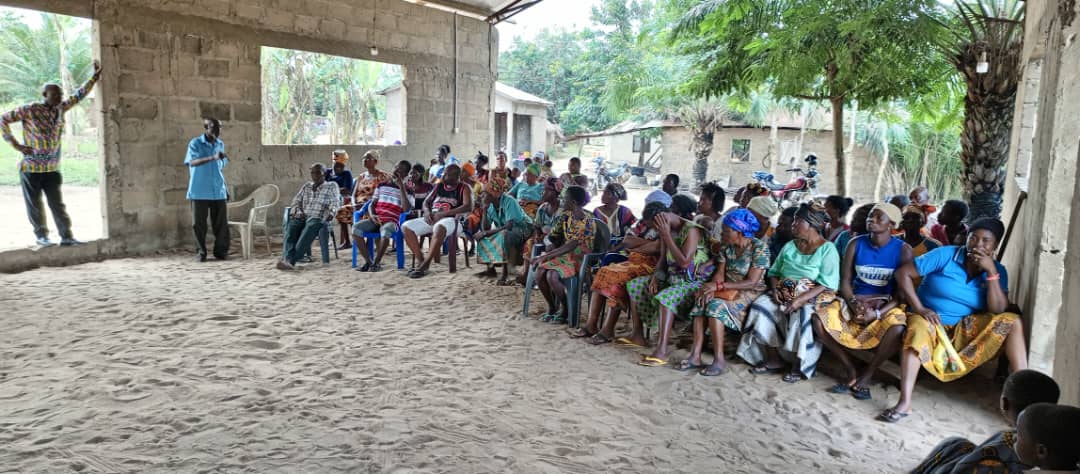
1. Sensitize three (3) communities on Teenage Pregnancy, Adolescence Sexual and Reproductive Health and Gender and Sexual base violence using Child Protection toolkits.
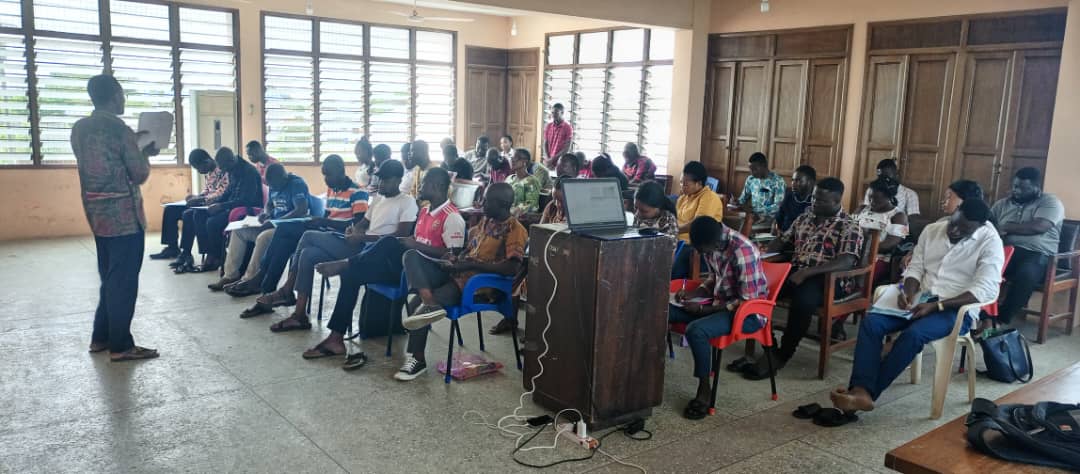
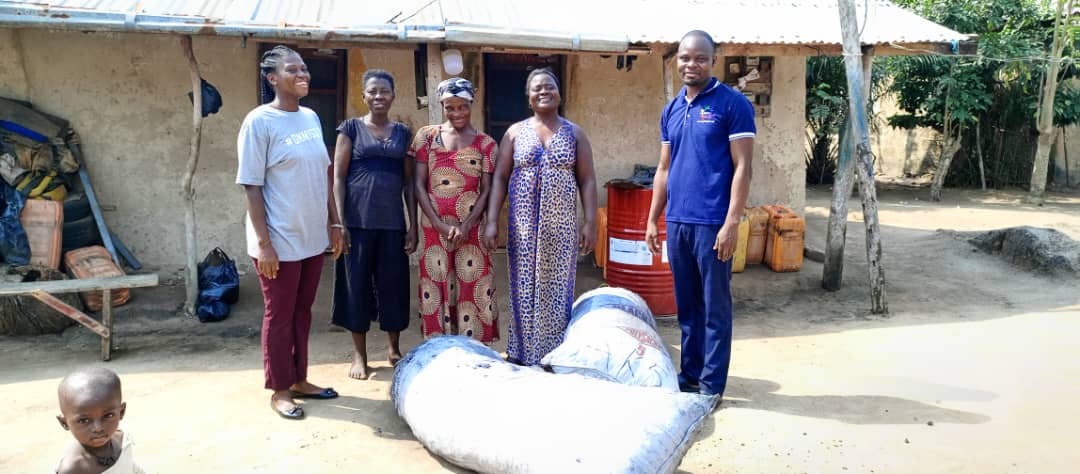
3. Supporting Case Management in Central Tongu and strengthening referral and linkages with other stakeholders.
COMMUNITY CARE
LIVELIHOOD EMPOWERMENT AGAINST POVERTY (LEAP)During the quarter, one LEAP cash out transfer was carried out. Two LEAP cycles were paid. However, the number of households is two thousand four hundred and eighty-one (2481).
CASH OUT STATISTICS
| TOTAL HHDS | TOTAL HHDS NOT CASHED OUT | TOTAL HHDS CASHED OUT | TOTAL AMOUNT DISBURSED | TOTAL AMOUNT CASHED OUT | TOTAL AMOUNT NOY CASHED OUT |
|---|---|---|---|---|---|
| 2,481 | 577 | 1,904 | 0 | 327,015 | 0 |
BREAKDOWN OF HOUSEHOLDS INTO MALE AND FEMALE
| TOTAL NO. HHDS | MALE HHD HEADS | FEMALE HHD HEADS |
|---|---|---|
| 2,481 | 699 | 1,782 |

LEAP OFFICIALS ARRIVING AT THE SHORES OF THE RIVER
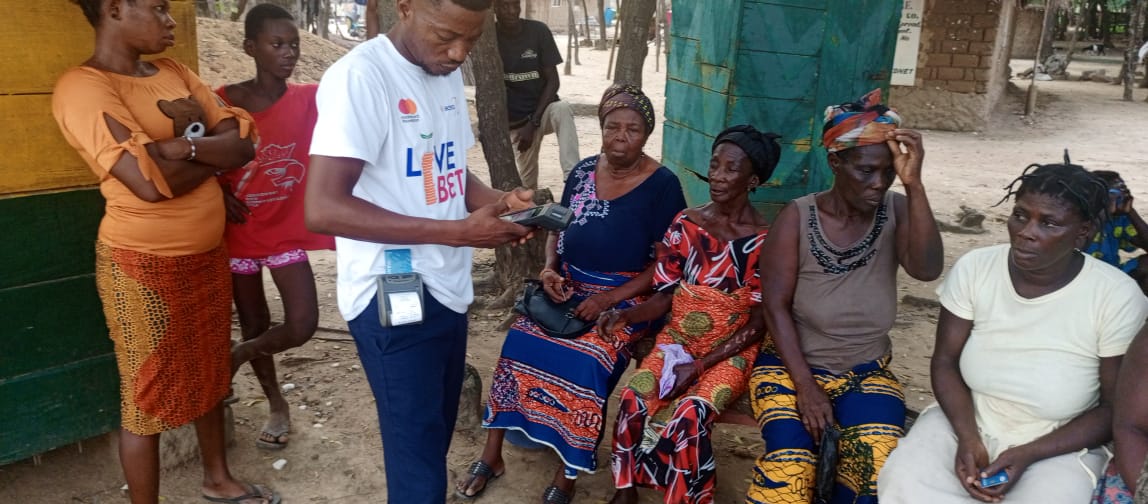
LEAP OFFICIALS DISBURSING CASH TO BENEFICIARIES

REGISTRATION OF LEAP BENEFICIARIES UNTO NHIS
The Office in collaboration NHIA is supposed to register and renew NHIS Card for LEAP beneficiaries for LEAP Phase 2B and LEAP Survey 8 group. It was estimated that Three Thousand Seven and seventy-four (3,774) beneficiaries should be registered and their cards renewed or replaced. According to the District Manager of the NHIA, there are shortage of cards to print new cards hence can only renew cards for now. This had caused delay in meeting our target. Hence the office has reached One thousand nine hundred and thirty-five (1,935) beneficiaries who had been registered into the scheme.

BREAKDOWN OF LEAP BENEFICIARIES REGISTERED UNTO THE NHIS
| S/N | NAME OF DISTRICT | START DATE OF THE EXERCISE | COMTPLETION OF THE EXERCISE | NO. OF NEW REGISTRATION | NO. OF CARDS RENEWED | NO. OF PEOPLE WITH ACTIVE CARDS | NO. OF CARDS RPLACED | CHALLENGES IF ANY | PROPOSED SOLUTION |
|---|---|---|---|---|---|---|---|---|---|
| 1 | CENTRAL TONGU | 15TH FEBRUARY 2021. | Yes | 804 | 3124 | 4550 | 96 | 1. Shortage of NHIS cards for new registration. 2. Network problems. 3 One NHIS office serving two districts | 1. NHIS Head Office should make available cards to the district office. |
WORK WITH DISABLES
In this quarter, the Disability Fund Management Committee couldn’t meet to approved applications. However, working items were procured for PWDs. Items like Deep Freezer




UPDATED NO OF PERSONS WITH DISABILITY CAPTURED IN THE DISABILITY ALBUM IN THE DISTRICT
TYPE OF DISABILITY| PWDs BELOW 65 YEARS COMPILED IN 2017 | MALE | TOTAL | FEMALE | TOTAL | GRAND TOTAL |
|---|---|---|---|---|---|
| PHYSICALLY CHALLENGED | 105 | 108 | |||
| MENTALLY CHALLENGED | 11 | 9 | |||
| VISUAL IMPAIRMENT | 20 | 33 | |||
| DEAF AND DUMB | 16 | 152 | 14 | 164 | 315 |
| PWDs ABOVE 65 YEARS COMPILED IN 2017 | |||||
| PHYSICALLY CHALLENGED | 39 | 70 | |||
| MENTALLY CHALLENGED | 8 | 7 | |||
| VISUAL IMPAIRMENT | 26 | 19 | |||
| PHYSICALLY CHALLENGED | 39 | 70 | |||
| DEAF AND DUMB | 9 | 82 | 6 | 102 | 184 |
| PWD’S BELOW 65 YEARS COMPILED IN 2018 | |||||
| PHYSICALLY CHALLENGED | 73 | 68 | |||
| MENTALLY CHALLENGED | 15 | 9 | |||
| VISUAL IMPAIRMENT | 35 | 20 | |||
| DEAF AND DUMB | 8 | 131 | 26 | 123 | 254 |
| PWD’S ABOVE 65 YEARS COMPILED IN 2018 | |||||
| PHYSICALLY CHALLENGED | 17 | 22 | |||
| MENTALLY CHALLENGED | 0 | 1 | |||
| VISUAL IMPAIRMENT | 27 | 16 | |||
| DEAF AND DUMB | 4 | 48 | 6 | 45 | 93 |
| PWD’S BELOW 65 YEARS COMPILED IN 2019 | |||||
| PHYSICALLY CHALLENGED | 17 | 16 | |||
| MENTALLY CHALLENGED | 2 | 3 | |||
| VISUAL IMPAIRMENT | 2 | 4 | |||
| DEAF AND DUMB | 3 | 24 | 4 | 27 | 51 |
| PWD’S ABOVE 65 YEARS COMPILED IN 2019 | |||||
| PHYSICALLY CHALLENGED | 6 | 6 | |||
| MENTALLY CHALLENGED | 0 | 0 | |||
| VISUAL IMPAIRMENT | 3 | 2 | |||
| DEAF AND DUMB | 0 | 9 | 3 | 11 | 20 |
| PWD’S ABOVE 65 YEARS COMPILED IN 2020 | |||||
| PHYSICALLY CHALLENGED | 2 | 2 | |||
| MENTALLY CHALLENGED | 0 | 0 | |||
| VISUAL IMPAIRMENT | 1 | 2 | |||
| DEAF AND DUMB | 1 | 4 | 1 | 5 | 9 |
| PWD’S BELOW 65 YEARS COMPILED IN 2020 | |||||
| PHYSICALLY CHALLENGED | 8 | 10 | |||
| MENTALLY CHALLENGED | 1 | 1 | |||
| VISUAL IMPAIRMENT | 1 | 2 | |||
| DEAF AND DUMB | 0 | 10 | 1 | 14 | 16 |
| PWD’S ABOVE 65 YEARS COMPILED IN 2021 | |||||
| PHYSICALLY CHALLENGED | 1 | 0 | |||
| MENTALLY CHALLENGED | 0 | 0 | |||
| VISUAL IMPAIRMENT | 0 | 0 | |||
| DEAF AND DUMB | 0 | 0 | 0 | 0 | 0 |
| PWD’S BELOW 65 YEARS COMPILED IN 2021 | |||||
| PHYSICALLY CHALLENGED | 1 | 0 | |||
| MENTALLY CHALLENGED | 0 | 0 | |||
| VISUAL IMPAIRMENT | 0 | 0 | |||
| DEAF AND DUMB | 0 | 1 | 0 | 0 | 1 |
| PWD’S ABOVE 65 YEARS COMPILED IN 2022 | |||||
| PHYSICALLY CHALLENGED | 2 | 3 | |||
| MENTALLY CHALLENGED | 0 | 0 | |||
| VISUAL IMPAIRMENT | 0 | 0 | |||
| DEAF AND DUMB | 0 | 2 | 0 | 3 | 5 |
| PWD’S BELOW 65 YEARS COMPILED IN 2022 | |||||
| PHYSICALLY CHALLENGED | 9 | 12 | |||
| MENTALLY CHALLENGED | 1 | 1 | |||
| VISUAL IMPAIRMENT | 6 | 2 | |||
| DEAF AND DUMB | 16 | 1 | 16 | 32 | |
| TOTAL | 477 | 517 | 994 |
REGISTRATION OF INDIGENTS ONTO THE NATIONAL HEALTH INSURANCE SCHEME.
The office in collaboration with the National Health Insurance Authority is required to register indigents who are vulnerable in the district. Within this quarter, a total of one thousand one hundred and seventy-seven (1177) indigents were registered, of which five hundred and seventy-nine (459) were males whiles six hundred and one (718) were females.
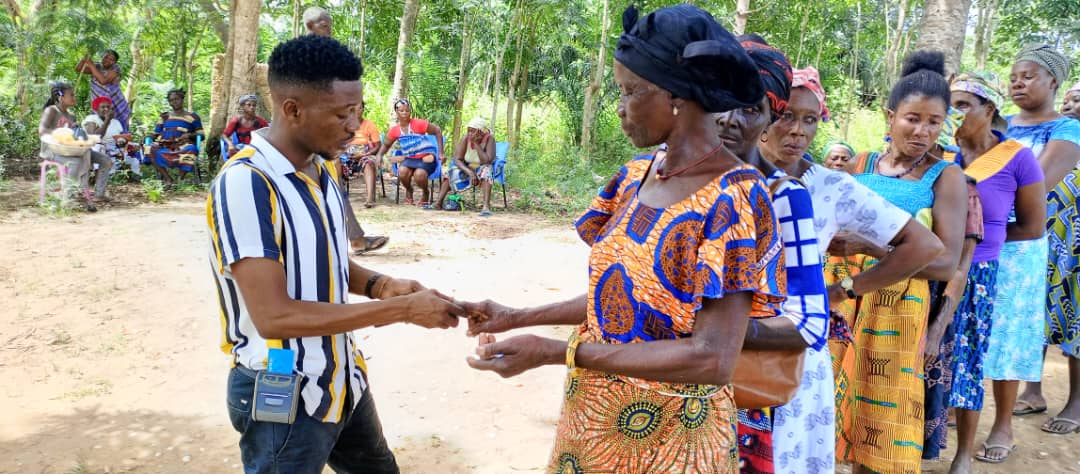
STATISTICS OF INDIGENTS REGISTERED UNTO THE NHIS
| MALE | FEMALE | TOTAL |
|---|---|---|
| 459 | 718 | 1177 |
REGISTRATION OF PWDs ONTO THE NATIONAL HEALTH INSURANCE SCHEME.
The office also in collaboration with National Health Insurance Authority registered and renewed NHIS cards for two Persons with Disability in the district.STATISTICS OF PWDS REGISTERED UNTO THE NHIS
| MALE | FEMALE | TOTAL |
|---|---|---|
| 0 | 1 | 1 |
AVAILABILITY OF DEDICATED HOTLINE FOR THE VULNERABLE GROUP
Functional Hotline for Vulnerable Groups
The Department of Social Welfare and Community Development has dedicated for its operations certain hotlines to be reached by the vulnerable groups in the community.The hotlines have been given to all vulnerable groups to access information or furnish the Department with information and also for emergency cases. The line has been very active for all the vulnerable groups in the District:
The disability groups, People with HIV/AIDS, LEAP beneficiaries, women and children who have suffered violent from their spouses, parents and people in the community. The chiefs and Assembly members have access to the hotline to lodge complains when necessary.
Hotlines; 1. Hotline 0554205158
2. Atokple Lucky Head of Department (Social Welfare and Community Development) Tel: 0241790099/ 0205351267
TRANSITIONAL HOME / SHELTER.
Transitional housing is a supportive housing that helps fight the homeless problem in today’s society.Transitional housing is generally for a limited time period. Stays can be from two weeks to twenty-four months. Transitional housing provides people with help after a crisis such as homelessness or domestic violence. Currently we have one transitional housing/shelter located in our district.
We also provide transitional assistance to the following vulnerable groups;
• Victims of Sexual Assault.
• Victims of Domestic Violence
• Persons with Mental Health Issues
• Substance use and Addiction victims
• Legal and justice Issues victims
• Refuges
• Teen mothers.
The District Assembly in collaboration with the Department of Social Welfare and community Development was able to secure a place to be used as a Shelter/ Transitional Home in the year 2020. The Shelter is called Adidome Home for the Vulnerable.
It’s a three-bedroom bungalow that was allocated to the department to be used as a shelter. It’s owned by the District Assembly.
The premise is situated around E.P primary School with GPS address VV-0058-3465. The home has two staffs from the Department. Madam Barbara Amatefio is the main Caregiver.
During the quarter, no person was sent to the shelter.

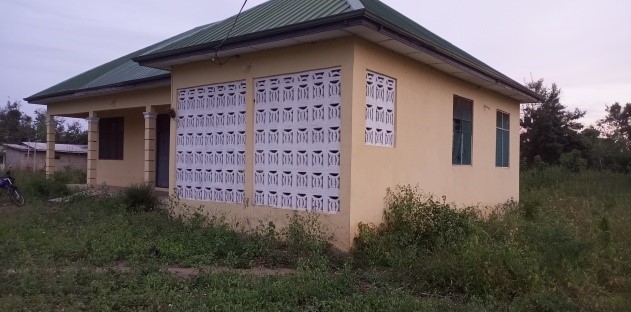
NUTRITION
Orientation for Food Vendors and School Feeding Contractors in Central Tongu District
The above programme was organised for food vendors and school feeding contractors in the District on Tuesday, 13th September, 2022 at the E.P church at Mafi Kumase. The programme was meant to orient school feeding contractors and food vendors in the District on nutrition. The programme was led by The District Assembly and partnered with the Department of social Welfare and Community Development, Ghana Health Service and Environmental Health Unit. The programme was geared towards educating the participants on how best to practice good hygiene during food preparation to for students and the public in general. Participants were also oriented on the combination of food nutrients to prepare a balanced diet to promote good health among student and the public. The programme attracted three hundred and twenty-five (325 participants). Three Hundred (300) food vendors and twenty-five school feeding contractors. Below is the segregation of participants:
| Food venders | School feeding contractors | TOTAL | |
|---|---|---|---|
| Participants | 300 | 25 | 325 |
WORK WITH NGO
TITIAN MINISTRIES - WORK WITH THE AGED.
Fifty (50) people are being supported with food items in Adidome by Titian Ministries monthly. The food items include; 5kg bag of rice, detergents, and some quantity of beans are given to each of them every third Friday in the month. Since Titian Ministries is a missionary organization, they always use the opportunity to evangelize to the people.
PANEL DISCUSSION ON ENDING ADOLESCENT PREGNANCY, ABUSE AND EXPLOTATION ORGANIZED BY INTERNATIONAL NEEDS(IN).
This program was actually organized to commemorate the celebration of “International day of the Girl Child” which took place on Tuesday, 11th October,2022. It saw the attendance of key stakeholders in the Volta region from some selected districts. Some of these key stakeholders were the Volta Regional Director of Social Welfare, Madam Stella Mawutor, the Adidome district Crime officer, the Adidome district Nurse Officer, Girl Child Education Officer from Akatsi North and other representatives from Akatsi South, Dambaye, Angloga, Ketechrachi as well as some religious leaders.Arrival and registration of participants, opening prayer and introduction of dignitaries formed the preliminary part of program. This was accompanied by cultural and choreographic performance by some of the students of the International Needs Vocational School.
A message from International Needs Ghana was read by Vera Elikem Awuye (Senior Program Officer, Gender Empowerment) with much focus on efforts to ensure conducive environment for all adolescents, especially, girls thrive to their full potentials holistically against all odds. She emphasized the efforts of International Needs in ensuring all these.
A documentary on activities of Safe and Protective Environment for Adolescent Development (SPREAD) Phase II in the Central and Volta regions was projected for the gathering. The documentary showed some of the things done by IN under SPREAD-Phase II which were of great benefits to the people in the areas of education, economic empowerment, talent development and what have you. People testified about they have been positively impacted by SPREAD. Some of these people were parents, community members, teachers and heads of schools. Some children who dropped out of school due to poverty in the home ended up being enrolled in vocation learning, others going back to school and so forth and so on as a result of the support from SPREAD.
One of the students on behalf of the others presented a petition to stakeholders to end adolescent pregnancy, abuse and exploitation. In the petition, they indicated how most adolescents end up dropping out of school through teenage pregnancy, child marriage and abuse as a result of some parents pushing their girl children into intimate relationships just for the children to bring some money home to support the upkeep of the home. Other girls are also forced into engaging in intimate relationship to get money to buy sanitary pads during menstruation as well as provide their needs due to the failure of their parents to do so. They therefore appealed to the government and all stakeholders to get parents to be more responsible towards their children, especially, the girl children to prevent them from falling prey to teenage pregnancy, abuse and exploitation. The appeal also indicated that girls will be very appreciative if the government can at least make monthly supply of a pack of sanitary pad to every rural teenage girl or take off the importation task on sanitary pads to make them affordable.
Panel discussion on the topic “Ending Adolescent Pregnancy, Abuse and Exploitation” held with a five (5) member panel. Panel members were asked three rounds of questions to be answered from their individual capacities and perspectives. Panellists were: • to indicate their portfolios or designations at their work places and the role they can play in the lives of adolescent girls. • what their offices can do to bridge the gaps that bring about teenage pregnancy as spelt out in the petition of the adolescent girls.
In turns they all answered the questions posed to them in the following manner: Starting with the Volta Regional Director of Social Welfare who outlined the following points from her jurisdiction: • Address issues faced by children and the vulnerable in general of which the adolescent girl is part. • Ensures the protection of the rights of the child including adolescents. • Case management on children, adolescents and the vulnerable in areas such as maintenance, defilement, rape, teenage pregnancy, child marriage, child trafficking, etc. • Community engagement to reduce the emergence of social issues in the communities through sensitization of community members using child protection toolkits.
Girl Child Education Officer: • Ensures that girls attend school and remain in school. • Sometimes supplies sanitary pads to adolescent girls to prevent them from staying away from school during that time of the month. • Provides guidance and counselling to adolescent girls to aspire to higher heights in society by being dedicated and focused to their education and leading responsible lifestyle. Ghana Health Service (GHS): • Education on adolescent reproductive health. • Monthly iron folic acid administration to adolescent girls to aid normal menstrual cycle. Assembly Members: • Making of bye-laws to address issues that have been omitted in the national constitution to ensure the well-being of community members. • Direct social issues brought to their doorsteps which fall outside their jurisdiction to the appropriate institutions and departments for redress and follows up to their total conclusion. Ghana Police Service: • Investigates social issues of abuse, violence, etc brought to it and ensure prosecution of perpetrators to deter others from doing same. At the end, each panellist was made to give his or her final contribution on the way forward on the topic, a closing remark was given and the curtain was drawn on the program.

CARE PROGRAMME
GOOD SAMARITAN HOME
The Good Samaritan Home is a rehabilitation center for the mentally challenged persons (i.e. Persons with intellectual disability). The center is located in Adidome. It gives educational and moral orientation to boys and girls. Its main objectives are; 1. Foster the dignity of the mentally challenged persons who are left most often at the corridor of societal ridicules. 2. Create a harmonious education in areas of affectivity, social, moral and spiritual. 3. Facilitate a better understanding of the mentally challenged persons in our society and 4. Promote a social, relational and friendly environment for the growth of the mentally challenged person. The home currently has twenty- five (5) mentally challenged persons of which eighty are boys and seven are girls. The Good Samaritan Home is a boarding system which accommodates individuals, both far and near. The programmes of the center are classified into two major parts. The first part comprises theoretical lesson such as English, Arithmetic, moral conduct, personal hygiene and social affairs programmes. The second part comprises of practical lesson such as bead making, broom making, basket weaving etc.
STATICS OF CHILDREN AT THE HOME.
| S/N | MALE | FEMALE | TOTAL |
|---|---|---|---|
| 1 | 18 | 7 | 25 |
INTERNATIONAL NEED SAFE AND PROTECTIVE ENVIRONMENT FOR ADOLESCENT DEVELOPMENT (SPREAD) PROJECT (PHASE TWO).
Due to the increase in teenage pregnancy in the district, some organizations are helping the district to help reduce it and one of such is the International Needs under the Safe and Protective Environment for Adolescent Development (SPREAD) Project. During the quarter, sensitization programmes were organized at the four communities. They four communities were Mafi Tsawula, Tsakpo, Mafi Tsati and Dekpoe. One community engagement was conducted in each community.During the quarter, seven children were rescued and sent to a shelter at Madina. The Anti-Human Trafficking Unit of Ghana Police Service was involved in the rescues process. The office is collaborating with International Needs Ghana to rehabilitate the rescued children from child labour. Some of these rescued children were found to be having some behavioural challenges due to the trauma they went through in the hands of the traffickers. For this reason it has become necessary for them to have some psychosocial counseling and rehabilitation. A court process was initiated and a care order and the children have been placed at a temporary shelter
COMPASSION INTERNATIONAL
Compassion International partnered with local churches to have the Child Protection and Promotion programme in the district. So far they have eleven centers spread throughout the district. Each center is caring for not less than two hundred needy and vulnerable children. They took care of their health needs, educational needs and any other need a child needs. In this quarter, the District Officer was invited by one of the Centers to sensitize parents of these children on issues pertaining to child protection. The center was at Mafi Dugame. During the programme officers talked on child abuse problems and issues relating to protection of children. A total of seventy parents and two hundred and fifteen Junior High School students were present. The surprising issue that we noticed was that when it was time for questions and answers, the school children took the lead and all their questions centered only on teenage pregnancy and abortion and they were very passionate about it. This gives us the need to plan for another meeting where personnel of Ghana Health Service would be invited to explain the issues raised to them thoroughly.
GENDER ACTIVITIES:
SENSITIZATION PROGRAM IN COMMUNITIES ON SEXUAL BASED VIOLENCE
The office also continued the sensitization of communities under the UNICEF supported programme in the following communities on gender roles analysis. This refers to the different roles and responsibilities performed by both sexes in the home. In this exercise, flash cards depicting various roles played by both sexes in the home are shown one after the other to the people and the people present chose out of the lot those performed by the different sexes and that of the girls are separated from that of boys. Among the lot in all cases about eighty percent of the cards show those performed by females and the rest by those performed by males. The ensuing discussions revealed to the people they are rather destroying the girl child in the name of tradition for decades. They always realized what was tradition left to them by their forefathers yesterday is not relevant today. The tradition that the females place of work is the kitchen, home chores and making babies. They always understood the need to relieve the girl child of the many home chores to enable them also develop well in future. In this, families now vow to share home chores among both males and females equally to give room to the females also to attend school just like their male counterparts.
| COMMUNITY | MALE | FEMALE | TOTAL |
|---|---|---|---|
| Bakpa Todze | 11 | 16 | 27 |
| Kpogede | 16 | 35 | 51 |
| Tsetsekpoe | 12 | 18 | 30 |
| Agbozume | 21 | 31 | 52 |
| Dekpoe | 37 | 49 | 86 |
| Agbakpeame | 29 | 36 | 65 |
| Amelorkope | 21 | 29 | 50 |
| Bakpa Adzani | 19 | 37 | 56 |
| Anekpo | 16 | 32 | 48 |
| Anfoe | 8 | 19 | 27 |
| TOTAL | 190 | 302 | 492 |